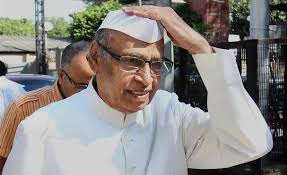New Delhi, Oct 21: Convicted Congress leader Rashid Masood today became the first MP to lose his seat after the Supreme Court struck down a provision that protects a convicted lawmaker from disqualification on the ground of pendency of appeal in higher courts.
66-year-old Masood was held guilty in a case of corruption and other offences in September. His conviction was the first after the Supreme Court struck down a provision in the electoral law that provided immunity to MPs and MLAs from immediate disqualification.
Sources said the notification formally announcing a vacancy in the Rajya Sabha following Masood's disqualification was issued by Rajya Sabha Secretary General Shumsher K Sheriff.
A copy of the notification has been sent to the Election Commission for necessary action, the sources said.
Lok Sabha MPs Lalu Prasad and Jagdish Sharma, both convicted in the fodder scam, are set to be formally disqualified as the Lok Sabha secretariat is likely to follow suit.
In September, a special CBI court had held Rajya Sabha member Masood guilty in a case of corruption and other offences.
Masood, Minister of Health in the VP Singh government between 1990 and 1991, was held guilty of fraudulently nominating undeserving candidates to MBBS seats allotted to Tripura in medical colleges across the country from the central pool.
Special CBI Judge J P S Malik held Masood guilty of offences under the Prevention of Corruption Act and IPC Sections 120-B (criminal conspiracy), 420 (cheating) and 468 (forgery).
Masood's conviction is the first case after the July 10 Supreme Court judgement that struck down sub-section 4 of Section 8 of Representation of the People Act, under which incumbent MPs, MLAs and MLCs can avoid disqualification till pendency of the appeal against conviction in a higher court. The appeal has to be made within three months of the conviction.
Seeking to negate the SC verdict, government had introduced a Bill in Parliament in the Monsoon session. But following differences with the opposition, the bill could not be passed.
An ordinance on the lines of the bill was later cleared by the Union Cabinet on September 24 to protect convicted lawmakers.
But reversing its earlier step, the Cabinet on October 2 decided to withdraw the Ordinance as well as Bill in the wake of public outburst against it by Congress Vice President Rahul Gandhi.
The overturning of the decision came in the wake of Rahul Gandhi's trashing of the Ordinance as "nonsense". He had said it should be "torn" and "thrown out".
President Pranab Mukherjee had also questioned the government's decision on the ordinance.
Clearing the air about the procedure to be followed following conviction of an MP, Attorney General G E Vahanvati has recently told the Lok Sabha Secretariat that notification declaring the seats vacant should be issued immediately.
Giving his opinion for the second time in two weeks on the same subject, Vahanvati has made it clear that an MP stands disqualified the day he or she is convicted by a court and the notification announcing vacancy in seat should be done immediately.
He has also warned that any delay in issuing notification could mean non-compliance of a Supreme Court order.
The country's top law officer has made it clear that the notification should be issued by the concerned House from which the MP belongs.





Comments
Add new comment